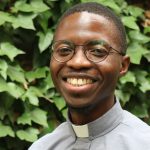In honor of International Migrants Day, Racial Justice invited guest writer Rev. Menzi Nkambule to share some thoughts on being a migrant in the United States.
What is your response when someone asks, “Where are you from?” Mine is a joke and reality. I often reply with my Eswatini accent, “I am from Decorah, Iowa.” I was raised in Eswatini, attended Luther College in Decorah and Luther Seminary in St. Paul, Minn., and am now a Lutheran pastor in Jersey City, N.J. For most people in America, “Where are you from?” is a tricky question. We need a different question if we are to be hospitable to one another.
When you ask people where they are from, you receive complex answers. Many Americans have lived in several parts of the country and, in some cases, the world. For example, some grew up in military families, moving from one base to another. Others grew up in a pastor’s family, moving from one church location to another. Like a plant, they were dug out of the ground and transplanted to a new place. Therefore, whether you were born in the United States or Eswatini, the question “Where are you from?” is, at best, challenging. At worst, it feels invasive and presumptuous, especially if asked of those born outside the U.S.
But do not worry; with generosity of spirit, there is nothing we cannot get past. Humor and genuine curiosity can generate a good conversation and help us connect in our similarities and differences. However, I find that, instead of “Where are you from?,” the question “Where is home for you?” embodies the generosity needed to spark instant connection.
In my experience, this alternative question reflects the kind of generosity that Leviticus 19:33-34 asks of us when it says, “When an alien resides with you in your land, you shall not oppress the alien. The alien who resides with you shall be to you as the native-born among you; you shall love the alien as yourself, for you were aliens in the land of Egypt: I am the Lord your God.” Ask someone “Where are you from?” or “Where are you really from?,” and that person may hear you saying that they don’t belong. But ask someone where home is, and you will have treated them as if they belong. You will have given them the joy and ease they need to put down roots in your community.
When I first came to the United States, I was 22, had never seen the doors of a Lutheran church and never in my life thought I wanted to be a pastor. Understandably, I was feeling out of place. But then the question “Where is home for you?” transformed me. My campus pastors were the first to ask me this question. It brought a much-needed shift in perspective, from home as a data point to home as the people with whom I feel safe attaching roots and exploring.
As time passed, I began to see Decorah as a community of belonging. By my senior year in college I had explored Lutheranism and gotten baptized at Good Shepherd Lutheran Church in town. I spent so much time with the pastors that I began to think I, too, could be a pastor. I studied management and made a leap to seminary and ordained ministry. Because I felt at home in Decorah, I belonged, planted roots and thrived.
Ultimately I am from Decorah and other places because I feel at home there. I believe that those transplanted across the globe or from one state to another need nothing more than for us to be their home. They need us to be what God calls us to be — the soil where the immigrants among us can take root and be at home in our communities.

The Rev. Menzi Nkambule is an ELCA Fund for Leaders alum serving as pastor of St. Matthew’s Lutheran Church, Jersey City, N.J. He enjoys cooking and cycling.
